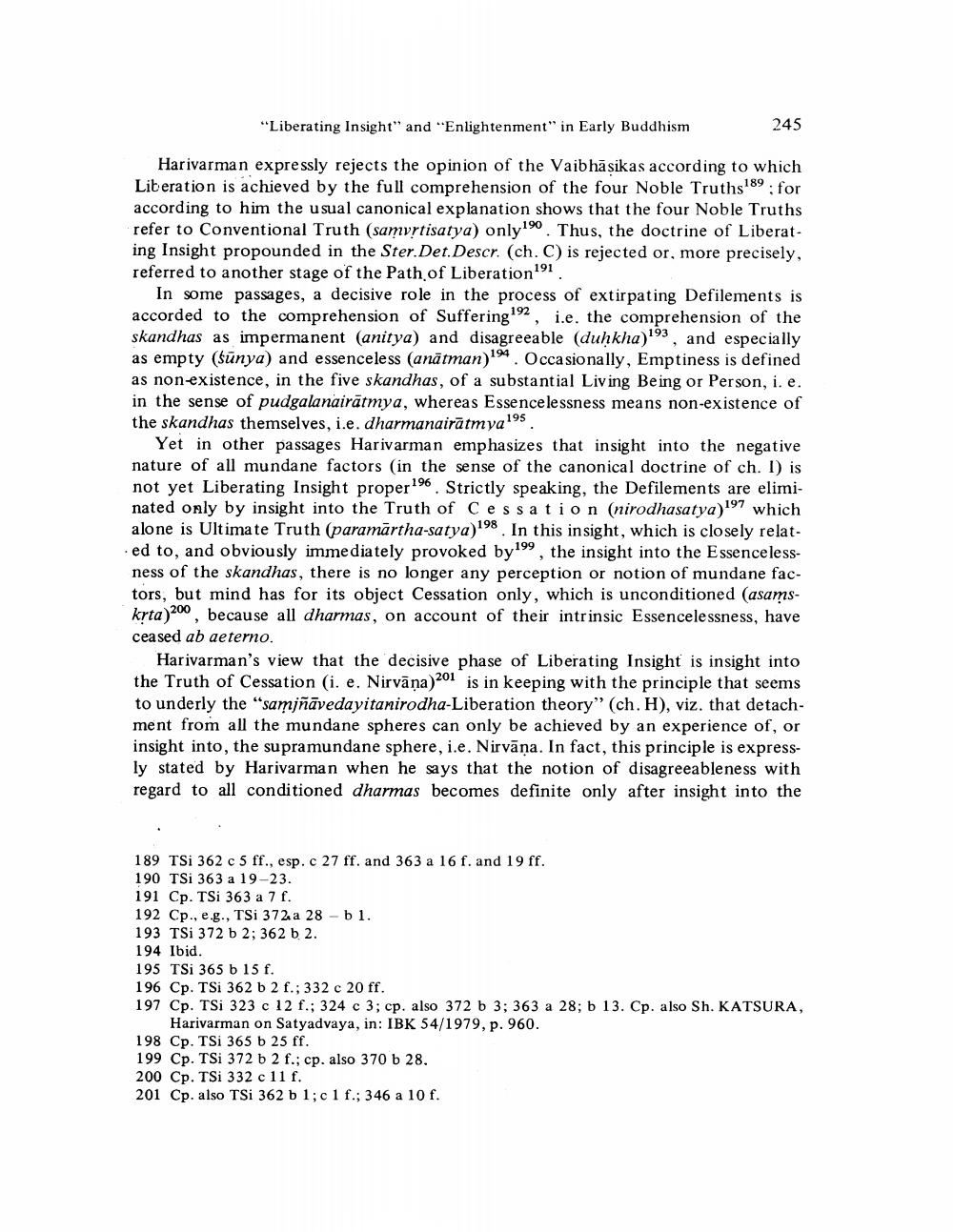________________
"Liberating Insight" and "Enlightenment" in Early Buddhism
245
Harivarman expressly rejects the opinion of the Vaibhāsikas according to which Liberation is achieved by the full comprehension of the four Noble Truths 89; for according to him the usual canonical explanation shows that the four Noble Truths refer to Conventional Truth (samvrtisatya) only 190. Thus, the doctrine of Liberating Insight propounded in the Ster. Det.Descr. (ch. C) is rejected or, more precisely, referred to another stage of the Path of Liberation 191
In some passages, a decisive role in the process of extirpating Defilements is accorded to the comprehension of Suffering"92, i.e. the comprehension of the skandhas as impermanent (anitya) and disagreeable (duhkha)193, and especially as empty (sünya) and essenceless (anātman)”. Occasionally, Emptiness is defined as nonexistence, in the five skandhas, of a substantial Living Being or Person, i. e. in the sense of pudgalanairātmya, whereas Essence lessness means non-existence of the skandhas themselves, i.e. dharmanairātmya"".
Yet in other passages Harivarman emphasizes that insight into the negative nature of all mundane factors (in the sense of the canonical doctrine of ch. 1) is not yet Liberating Insight proper 196. Strictly speaking, the Defilements are eliminated only by insight into the Truth of Cessation (nirodhasatya)"97 which alone is Ultimate Truth (paramartha-satya)"98. In this in sight, which is closely related to, and obviously immediately provoked by 199, the insight into the Essencelessness of the skandhas, there is no longer any perception or notion of mundane factors, but mind has for its object Cessation only, which is unconditioned (asamskrta)200, because all dharmas, on account of their intrinsic Essencelessness, have ceased ab aeterno.
Harivarman's view that the decisive phase of Liberating Insight is insight into the Truth of Cessation (i. e. Nirvāņa)201 is in keeping with the principle that seems to underly the "samjñāvedayitanirodha-Liberation theory" (ch. H), viz. that detachment from all the mundane spheres can only be achieved by an experience of, or insight into the supramundane sphere, i.e. Nirvāna. In fact, this principle is expressly stated by Harivarman when he says that the notion of disagreeableness with regard to all conditioned dharmas becomes definite only after insight into the
189 TSi 362 c 5 ff., esp. c 27 ff. and 363 a 16 f. and 19 ff. 190 TSi 363 a 19-23. 191 Cp. TSi 363 a 7 f. 192 Cp., e.g., TSi 372 a 28-b1. 193 TSi 372 b 2; 362 b 2. 194 Ibid. 195 TSi 365 b 15 f. 196 Cp. TSi 362 b 2 f.; 332 c 20 ff. 197 Cp. TSi 323 c 12 f.; 324 c 3; cp. also 372 b 3; 363 a 28; b 13. Cp. also Sh. KATSURA,
Harivarman on Satyadvaya, in: IBK 54/1979, p. 960. 198 Cp. TSi 365 b 25 ff. 199 Cp. TSi 372 b 2 f.; cp. also 370 b 28. 200 Cp. TSi 332 c 11 f. 201 Cp. also TSi 362 b 1;c1 f.; 346 a 10 f.




